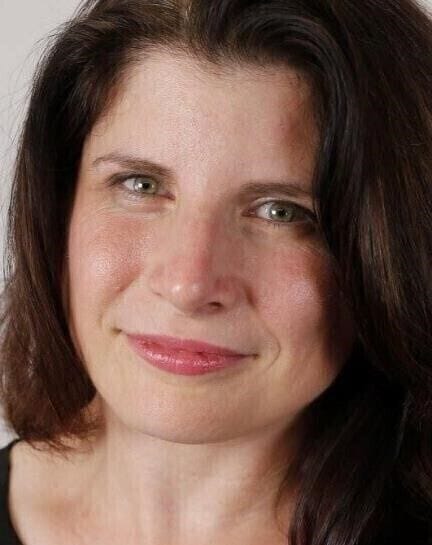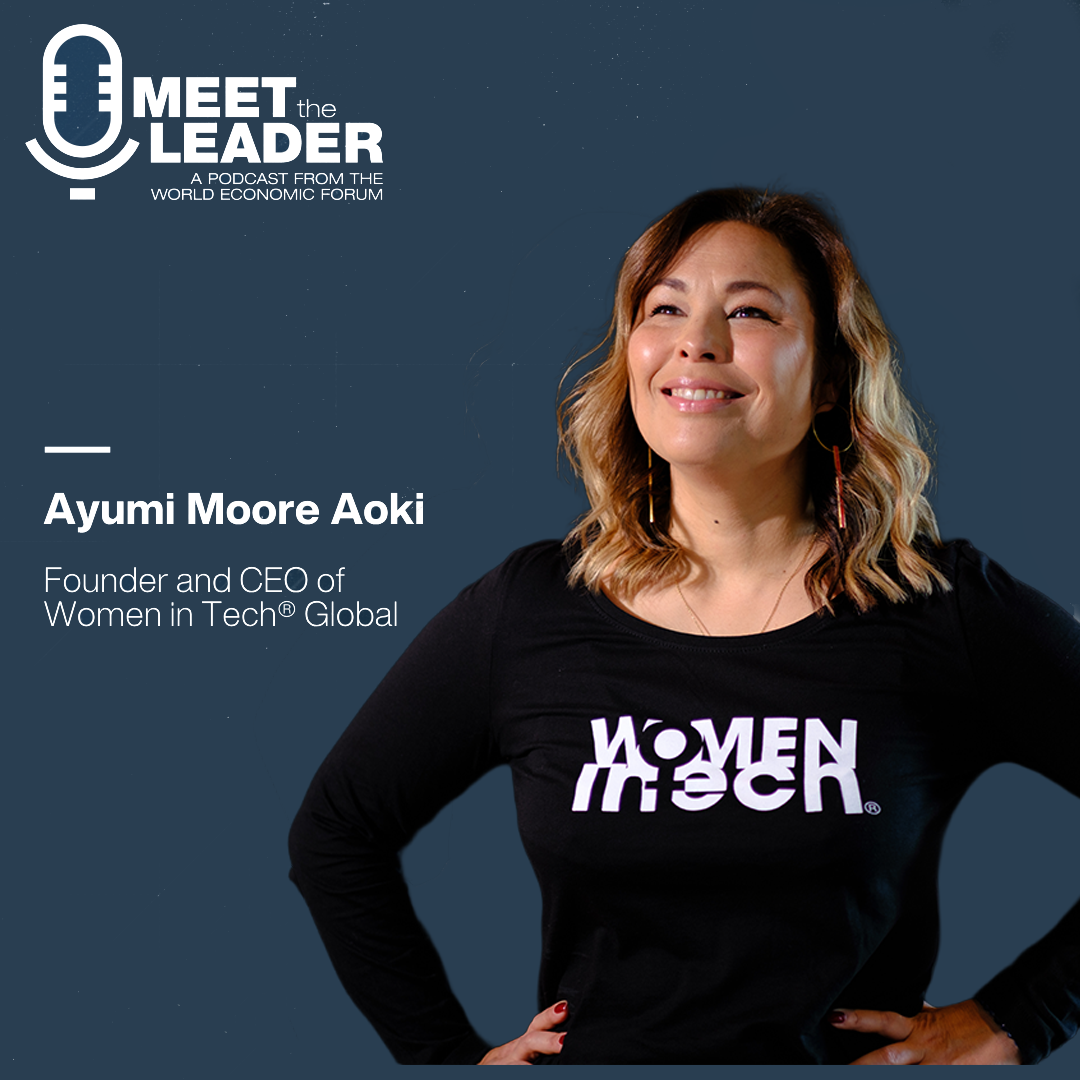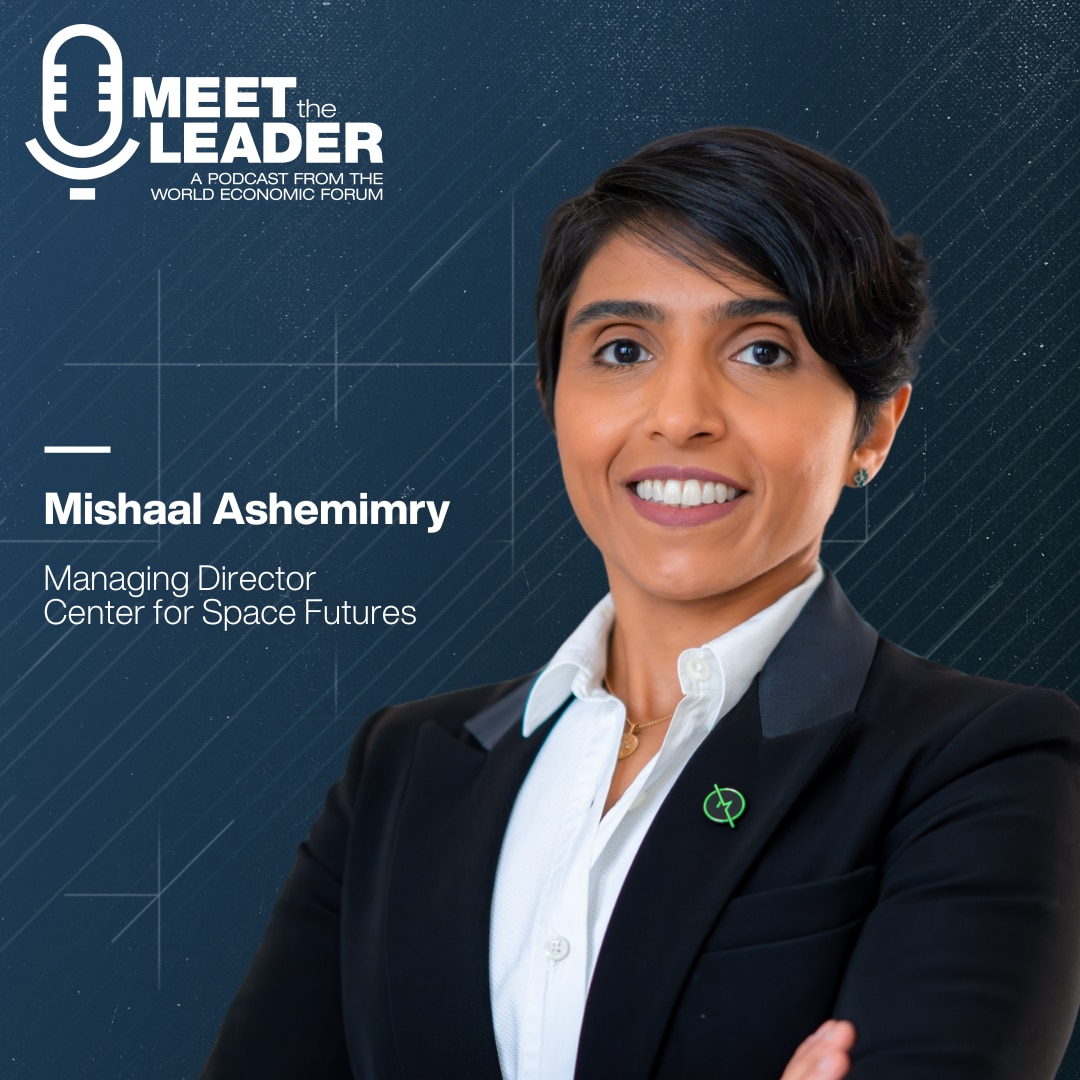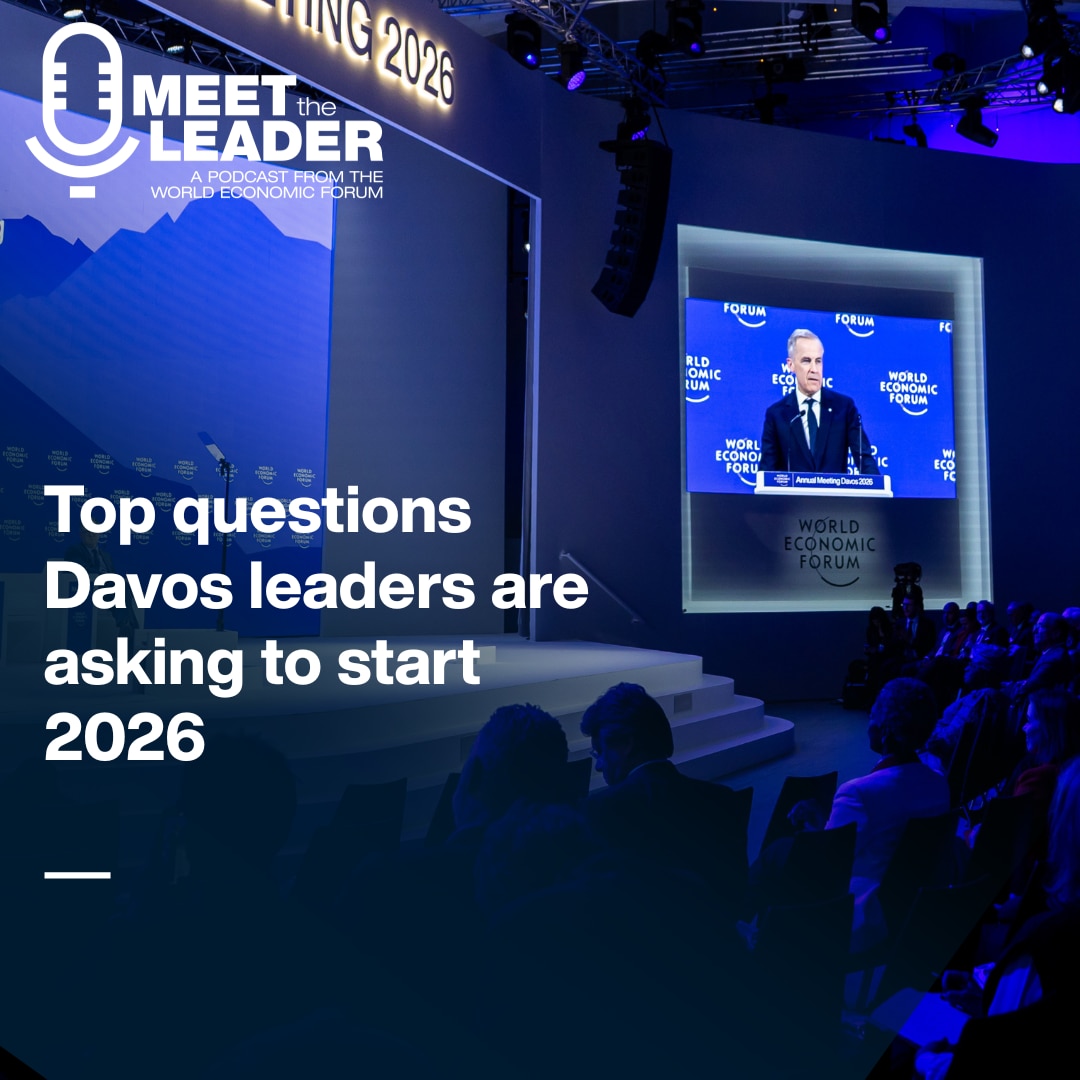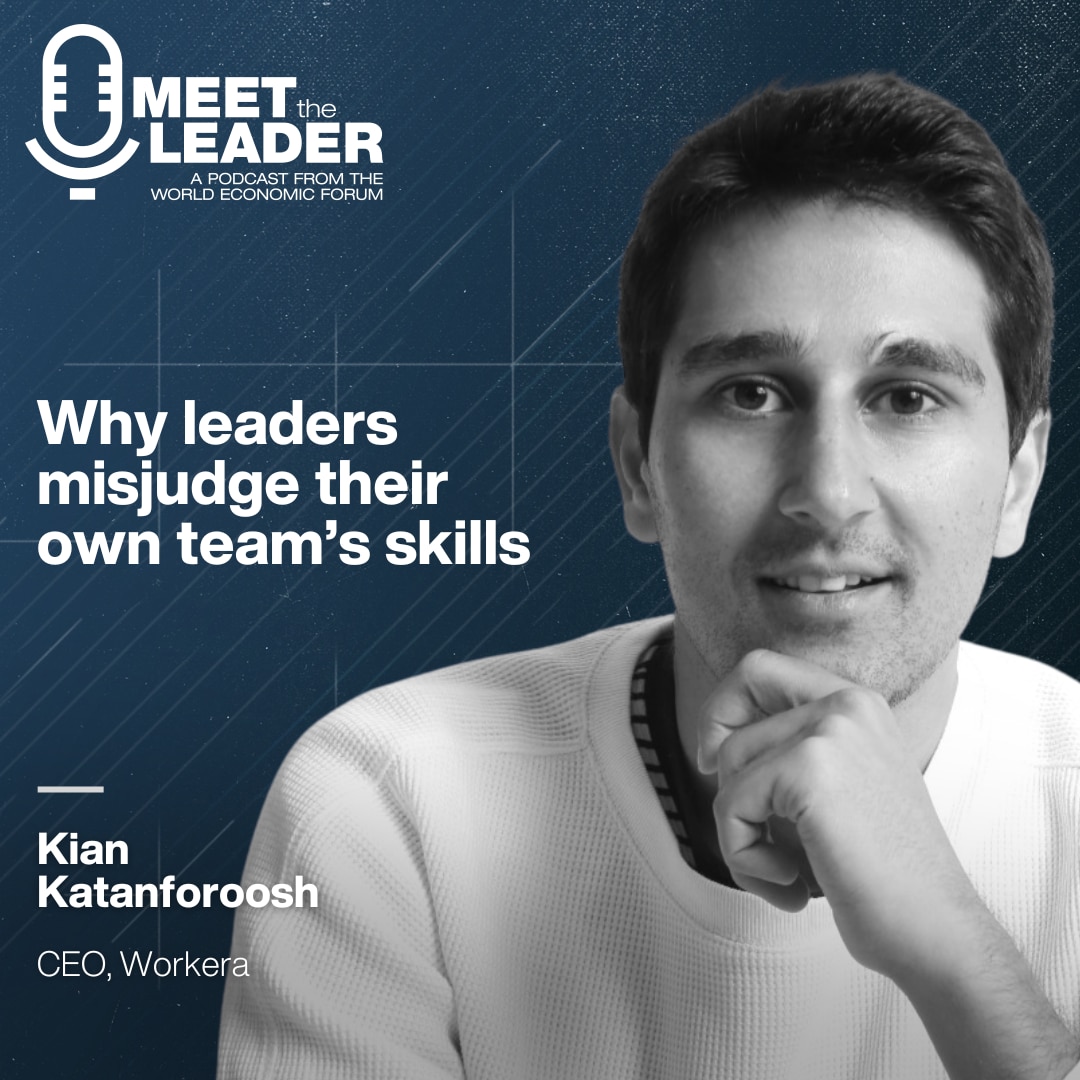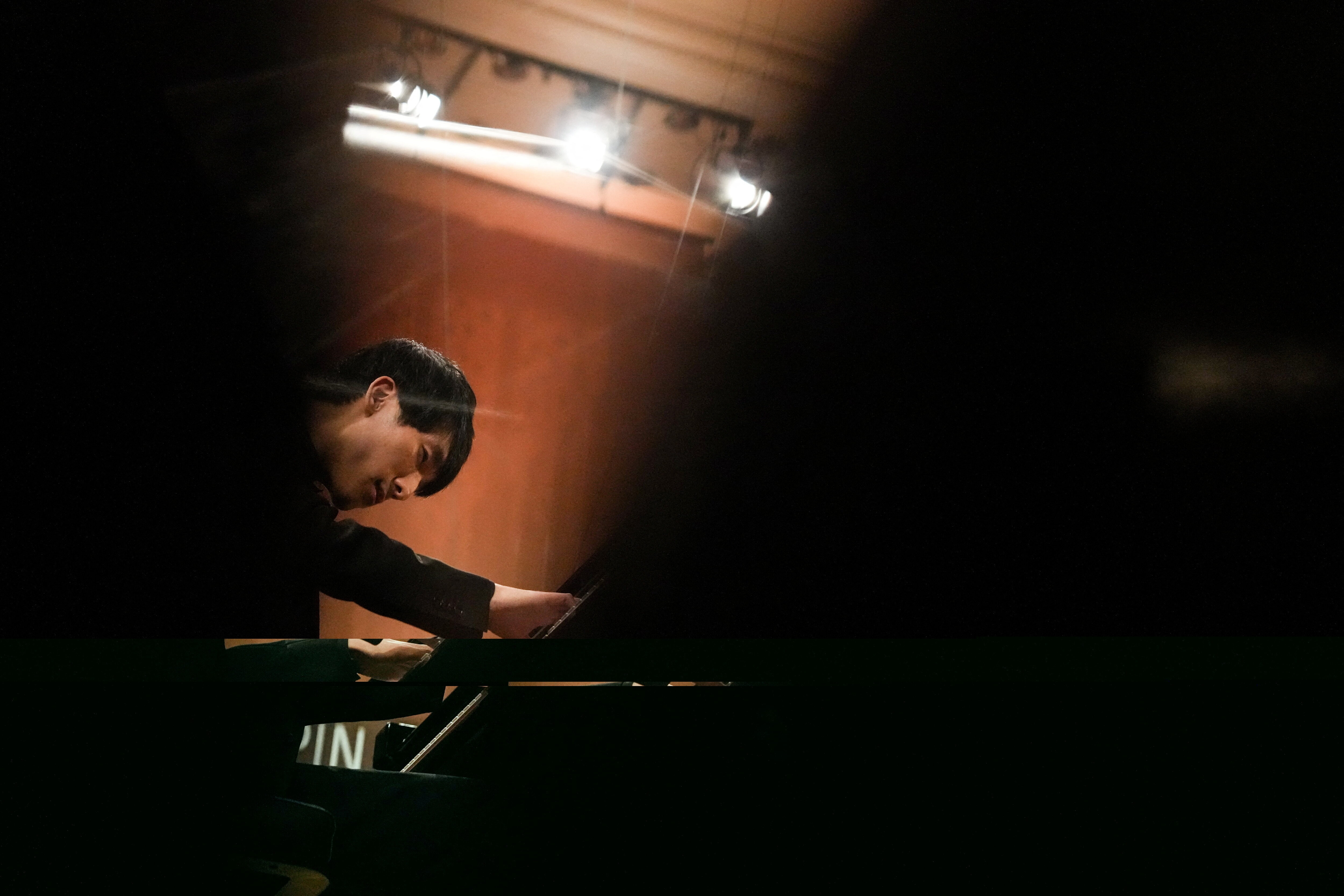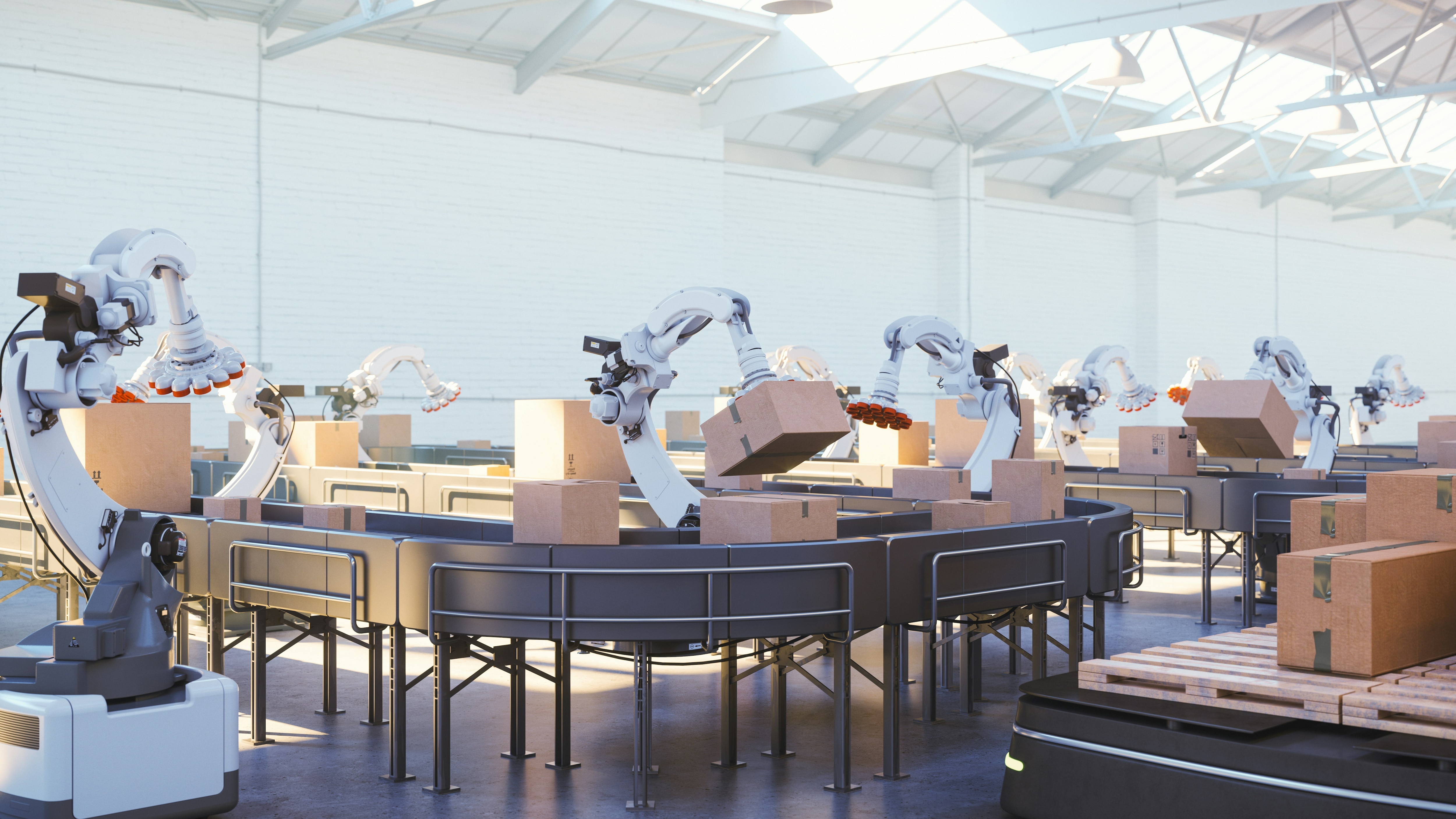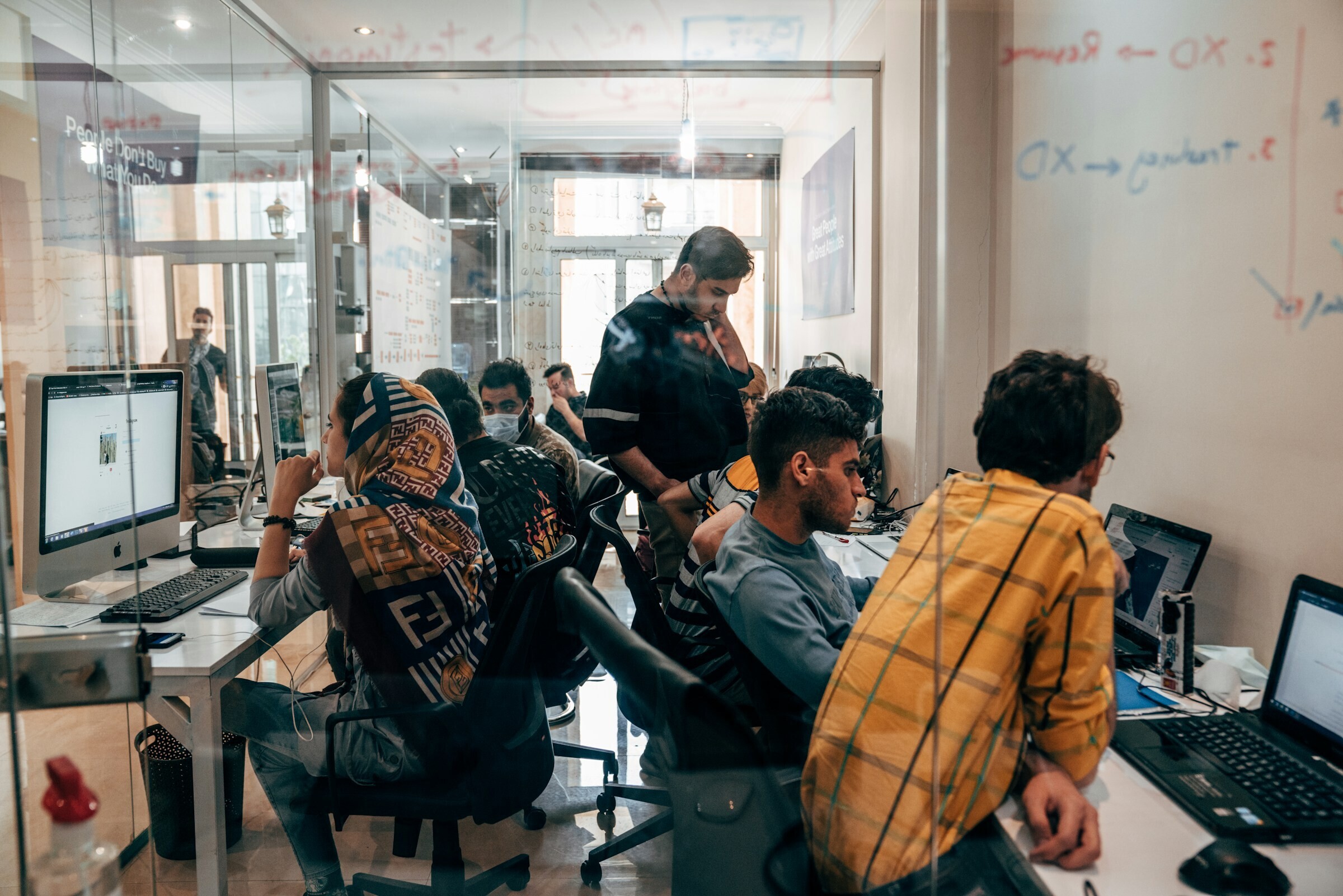Meta's Nicola Mendelsohn: To make an impact, break this habit first
Podcast transcript
This transcript, generated from speech recognition technology, has been edited for web readers, condensed for clarity, and may differ slightly from the audio.
Linda Lacina, World Economic Forum: Welcome to Meet the Leader, a podcast where top leaders share how they are tackling the world's toughest challenges.
Today's leader: Meta’s Nicola Mendelsohn. She'll talk about resilience and making the impact only you can.
Subscribe to Meet the Leader on Apple, Spotify and wherever you get your favourite podcasts. And please take a moment to rate and review us. I'm Linda Lacina from the World Economic Forum and this is Meet the Leader.

Nicola Mendelsohn, Meta: Control what you can control. Stop worrying about everybody, everything, else that's out there. There's lots of other people that are going to do that. And actually, those things can be quite paralysing. So, you focus on what you can do and that's how we'll all move forwards together.
Linda Lacina: In 2016, Nicola Mendelsohn was diagnosed with follicular lymphoma, an incurable blood cancer. This diagnosis was a shock and turned her day-to-day upside down. But it also reinforced for her a key philosophy: control what you can control.
It's a way she guides her teams at Meta, reminding her staff to focus on areas where only they can make the biggest impact.
And it's a way she builds support for the thousands of people each year diagnosed with this disease. In fact, seeing the need for a group that would put patients and doctors and scientists together, both for support and to seek a cure, she'd eventually found the Follicular Lymphoma Foundation in 2019.
I talked to Nicola about this and a host of other experiences that have shaped her as a leader across her 30 years of experience in advertising, marketing and technology and her current role as Head of Global Business Group.
She shared how she's helped create opportunities for women entrepreneurs and the innovative ways she's leveraged virtual reality during COVID for remote meetings.
She talked about all this, but first, she'll tell us more about the Follicular Lymphoma Foundation. I'll let her get started.
The more I got to understand my illness and the therapies that were being offered, the more I understood that sometimes it takes somebody to kind of galvanise people together.
Nicola Mendelsohn: I founded the Follicular Lymphoma Foundation in November 2019, and I did it because I was actually diagnosed with follicular lymphoma, which is an incurable Non-Hodgkin's blood cancer in November 2016.
And I guess at that time I naively thought that, well, with all the changes and developments in science, that maybe there will be a cure in the not-too-distant future.
But actually, the more I got to understand my illness and the therapies that were being offered, the more I understood that sometimes it takes somebody to kind of galvanise people together, crash heads together, raise some funds and get some awareness for something in order that it can happen. And actually, there'd never been a charity anywhere in the world for follicular lymphoma. So, I started it off.
At the same time we were creating this group on Facebook where we were bringing together follicular lymphoma patients. And literally just this week we've hit 10,000 patients, which is an extraordinary number for a rare cancer and something that I'm very proud of, working with the founder, a lady called Nicky in Australia.
But the aim of the foundation is to get out of the charity business as quickly as possible because we want to find a cure. And so that's what all the focus is on, it is about raising funds, raising awareness, partnering with biotech, with pharma, with clinicians around the world, and being that voice of the patient and funding things.
And we literally just, at the back end of 2022, we put our first two million funding into four different projects around the world that will hopefully accelerate getting towards that cure.
Linda Lacina: I also read that you, during COVID, because you were immuno-compromised a lot of time you needed to work remotely, but that you guys leveraged different types of technologies that maybe, you know, people aren't familiar with when it comes to that. Can you talk a little bit about that and how that worked?
Nicola Mendelsohn: One of the consequences of having something like a blood cancer was that the vaccines didn't actually work on people like me. And so not only I, but my family, had to be very careful in terms of who we came into contact with. And actually, for about 18 months, we really didn't see anybody else.
And so, I'm unbelievably grateful. One, to the scientists that eventually made a drug called Evusheld by AstraZeneca that was created for immunocompromised people so we could get back out and about. But two, that I could leverage technology. And I think if we think about what the pandemic would have been like without the access to technology that we have, it would have been very difficult.
And then you add on top that, you know, Meta had created the Quest, which is a much more immersive experience where you can harness VR, and we have a product called Horizon Workrooms, where you can actually go in and have a virtual meeting.
So, my team is a global team so we can come from all over the world and it's so much more immersive to sit around a table to ideate together. When you look left and somebody’s is talking to the left, everybody looks in that direction. You really have that feeling of presence when you're together. So, yes, my weekly meetings through the pandemic were held in our virtual VR Workrooms dressed as avatars.
Linda Lacina: So, being on the forefront of that type of remote work, are there any best practices or things that you're like, you know, if people are going to do this eventually they should think about this or that?
Nicola Mendelsohn: Yeah, I definitely think you should think how you want to look. So style your avatar. I mean, we had a lot of fun with that!
So actually, you don't have to look the same as you do in real life. And that's one of the things people do. So, we have a guy that was who's bald, actually. He used to rock up with all manner of different hairstyles because it was quite fun. A bit of a break the ice in a different way.
As a company Meta is very much embracing new ways of working, the future of work. I think, you know, in many ways the world of work hadn't changed since the industrial area. Very much based on, you know, the factory life, and now we see so many different possibilities in terms of how we come together. Is it physical? Is it virtual? Is it a virtual reality? So, we see very much that we're still in a period of learning as a company. And I think that's a really exciting place to be.
Linda Lacina: Are there other things that, having done this, you could potentially see people using VR for maybe ten years from now when it comes to the workplace?
Nicola Mendelsohn: Yes, I'm actually already seeing some of it. So, we recently announced at our Connect conference that we have a partnership now with Microsoft and also Accenture. You know, if you think about how Microsoft disrupted the world of work with Office, with Windows, and then you also see the power of Accenture coming in, you know, this is really exciting, things that you can now get into with Quest.
And we're seeing already today so many different types of businesses actually embracing and utilising VR. They're using it for productivity. We're seeing a huge amount of usage from education organizations coming together. We see diversity training. We've seen companies like Hilton actually doing hospitality training. So this is a really exciting thing. We've seen Nestlé embracing shelf stacking and seeing different ways that they can use it. So actually we're seeing it already today. The world of health — surgeons are practicing. Much better to practice in VR, right? They’re able to perfect those techniques.
So yes, we're really seeing a good uptake in part because you've got that feeling of presence, in part because you can have that immersion, in part because you can be more creative and also fostering that sense of community at the heart of it.
Linda Lacina: Companies that, you know, they're not familiar with it yet and maybe they're a little hesitant because they're not sure how they would use it. How do you make the case to other others so that they can invest in it? What’s your advice to them?
Nicola Mendelsohn: Well, first thing I would say is try it. And certainly at the WEF this week, we've had lots of people coming in to the Meta house to be able to get on there and try it. We've got the latest version, the Quest Pro, which actually has mixed reality. Now, what's mixed reality, the people are saying that haven't even tried it yet.
This is the ability not to just to be in a virtual, but you can actually intersperse and see what's going on around you as well back in the real world. And here's the great benefit of that. If you want to grab your coffee, you're not fumbling around and looking where the coffee is. You can actually intersperse and see through. But it has so many other applications which are really exciting.
So, I think get involved with it, learn and listen and see what other companies are doing. So, there's a couple of things that I would definitely start with.
Linda Lacina: At the heart of you being able to have this remote, but also VR experience is empathy, right? It was a difficult time. People needed flexibility for a variety of different reasons. What do you think people still, you know, need to make sure that they don't overlook?
We've gone through a global crisis, the likes of which none of us have ever seen in our lifetimes. And so, I think the leaders that stood up were the ones that led with empathy.
Nicola Mendelsohn: Look, the last couple years have been very difficult for people. We've gone through a global crisis, the likes of which none of us have ever seen in our lifetimes. And so, I think the leaders that stood out were the ones that led with empathy.
I think one of the things as we're building out the metaverse one of the things we've been very conscious about is making sure that it's a place for everyone. And remember, we're not the only company that's going to be building the metaverse. So many different companies are going to come together. But from our side in the responsibility that we take, we're making sure that we're building in diversity and equity and inclusion right into the heart of it. And actually, we joked about the avatars before, but actually we have a quintillion different version of avatars that everyone coming on can find the version of themselves what they want to be.
And you think how different that is to how things were just a few years ago. That's the advances in technology, yes, but it's also having leaders leading with empathy and being deliberate and understanding that if you don't build the DEI in from the beginning, then it will get overlooked. And, you know, I'm really proud of some of the work we're doing in that area.
Linda Lacina: Tell me about SheMeansBusiness.
Nicola Mendelsohn: So, SheMeansBusiness is something that we launched back in 2016 and it was based on the observation that for many reasons, women don't set up businesses in the same way that men do. And what the wonderful thing about the Internet and platforms like Facebook and Instagram allow is, is an equity that anybody can set up a business now in a different way. And so, this is a whole training programme that we created that now has trained over a million and a half women in over 38 different countries to give them digital skills, to give them networking opportunities and to actually help with financial literacy. And it's very much making sure that we're listening to that community and giving them the tools that they need in order to go out and create successful businesses at at least the same rate that the men are doing.
Linda Lacina: What are some of these practical skills that this training is helping them and exposing them to?
Nicola Mendelsohn: One of the biggest things is, you know, if you think about how the world of trade used to be, if you were a small business owner, you were very much reliant on the people that would come past you on the high street. Whereas now you can actually set up a business from anywhere in the world with just a mobile phone.
And technologies like ours allows you to do personalised marketing at scale. And actually, you might have a customer that is in the local area, but that might also have a similarity with someone in different countries around the world. So, it allows you to get to the customers that really matter to you and to utilise the best creative ways in order to do that.
Linda Lacina: Women entrepreneurs, what are the maybe the specific needs that they have that this training helps to account for?
Nicola Mendelsohn: Yeah, so a number of different things. One is the fact that having a relatable role model. It's not enough to see a CEO of a great big Fortune 500 company. Actually, having someone that's kind of closer to you, maybe in a similar business or trade and can see that they got there. That's important.
Access to capital always comes up. Encouragement is also a really big one. Just having people around you going, come on, you can do this, you've got this. And it's not like they're not thinking about having ideas. The women have got those ideas. It's that combination of those things and then knowing where they can go and find, you know, find the customers. But, you know, that's the thing that kind of comes together that I'm really proud that our platforms can play a really good role in.
Linda Lacina: One of the themes of this particular Davos is just this idea of, you know, resilience. Given all the different crises we have simultaneously. The economic crisis. There is a climate crisis, there's an energy crisis, there's a conflict in Ukraine. There's all these things, you know. How can leaders be resilient in a time like this? What's needed most?
Nicola Mendelsohn: So, I think there's a few things. And, you know, picking up the atmosphere in terms of what's going on, it's a question I'm asking everybody when I'm meeting with them as well. Here's what we know: the only certainty is uncertainty. If we look back a year ago, we didn't envisage that and I think that's been very difficult to navigate through, for many, to be able to navigate through that.
As we start this year, we know that all that uncertainty is out there, which actually gives a greater confidence. I think that the resilience chops, we’ve all developed some more muscles in this area. So, I think that has also been important. We've seen different people doing different scenario plannings, but I'm hearing a cautious optimism here this week and I think that that's a good thing coming out, because we can also talk ourselves into different scenarios. And so, I think cautious optimism is a good mood.
Linda Lacina: What should these resilient leaders be prioritising? What in your mind is the one thing that they should be making sure that they do despite all of this disruption and simultaneous chaos?
Nicola Mendelsohn: Definitely deeds, not action. And we are also seeing more companies coming together now and actually wanting to partner and really, truly partner against all of these different crises. Where can we pull resources together? We're all looking to the next the same north stars, where are things not competitive advantage and actually just the right thing to do and good things to do. So, I'm very encouraged by some of the conversations that I've been seeing and witnessing and being a part of in terms of how we can all move forward together, which is really at the heart of the WEF.
Linda Lacina: Everybody has hit a wall where they're not sure how they're going to move forward. They do, but there's a moment where they're not sure. What's a moment like that for you that sort of showed your own resilience and how did you move through it?
Nicola Mendelsohn: So, I think for me, it's about breaking it down and really thinking through what are the things that you can control. Because I think from a leadership position you need to continue to make decisions and you need to continue to move forwards in order that everybody that's working with you can operate and do those same things as well.
So, I talk about that a lot with my teams. Control what you can control. Stop worrying about everybody, everything else, that's out there. There's lots of other people that are going to do that and actually those things can be quite paralysing. So, you focus on what you can do and that's how we'll all move forward together.
Control what you can control. Focus on what you can do and that's how we'll all move forward together.
Linda Lacina: And also somebody who was, you know, dealing with a surprise diagnosis, was there was there a point there that, you know, were trying to figure out how you're going to balance this? How are you going to manage all of your responsibilities, everything you know, was there a point there that you needed to have a turning point in how you reacted and move forward?
Nicola Mendelsohn: Yeah, very much so. So, I had gone from jumping on planes and going to business meetings and being really clear about what my diary looked like for the next six months. And then meeting with a doctor who said, no, actually your diary is now mine. I'm now in charge.
And so, it became from all these great big grandiose plans to very much more now in the moment, what do I need to do to go from one day to another, especially when I was going through treatment, which, you know, I'm very grateful that my treatment did work for me at that time. So that was a really good thing. But sometimes you have to think very large, but sometimes you just got to go day by day, depending on what the situation is and, you know, take stock.
I'm also somebody that practises gratitude. So, I'm actually feeling very joyful being here this week because, you know, for a good almost two years, I wasn't able to get out, wasn't able to go and see people and be around people. And so just having that connection again is just unbelievably energising and I'm grateful for it.
Linda Lacina: How have you changed as a leader in your career?
Nicola Mendelsohn: Oh, that's a huge question. Of course, huge amounts. You grow in confidence, you have experiences, you draw on those experiences. I think you trust your instincts more. I learned to use my voice more.
When I was younger in my career, I would have all these conversations in my head that were just exhausting in terms of, you know, should I do that? Should I not do that? Should I speak up or should I share an opinion? And of course, the answer is yes, do all those things you should. And, you know, just making sure that I'm seizing the opportunities that were out there, I think things become more instinctive the older you get.
Linda Lacina: Do you have a book that you recommend?
Nicola Mendelsohn: Anything by Adam Grant. Originals. Option B. Give and Take, all of those I absolutely just think he's so inspirational and also very practical. There’s so much of his work that actually I've taken into when I'm working with my own teams. So yeah, any of those.
Linda Lacina: Is there a piece of advice that you've always been grateful for?
Nicola Mendelsohn: Yes, definitely. So many.
Two things. This one's a fun one, which is that "you can't cry and whistle." So sometimes it can all get a little bit much. And if you whistle, I promise you, you can't cry at the same time.
But the other one is, it's an Eleanor Roosevelt quote actually, which is do the things you think you cannot do. Because when you do those things, you know they’re terrifying, but that's when you learn the most. That's when you push yourself. And then when you look back, you go, yeah, I did that and I was proud.
Linda Lacina: That was Nicola Mendelsohn. Thanks to her and thanks so much to you for listening. A transcript of this episode and my colleagues’ episodes. Radio Davos and the Book Club podcast is available at wef.ch/podcasts.
If you liked that episode, check out episode 75 from just last month when I talked to Caroline Casey, the founder of non-profit The Valuable 500, an organization that represents 22 million workers worldwide, focussed on ending disability exclusion. It's an inspiring conversation about what motivates her and the hard lessons she's learned firsthand as a founder. Anyone building something from scratch can benefit from her wisdom.
This episode of Meet the Leader was presented and produced by me, with Juan Toran as studio engineer, Jere Johansson as editor and Gareth Nolan driving studio production. That's it for now. I'm Linda Lacina with the World Economic Forum. Have a great day.
A blood cancer diagnosis turned this Meta exec's day-to-day upside down in 2016. But it also reinforced a key personal philosophy: control what you can control. It's an approach that she stresses to her teams at Meta, reminding her staff to stop worrying about what they can't change and to focus instead on areas where they can make the biggest, most unique impact. And it's an approach that has empowered her to make change happen for others, inspiring her to build a special charity to seek a cure: the Follicular Lymphoma Foundation.
In this episode, recorded at the 2023 Annual Meeting in Davos, Mendelsohn shares what she's learned about focus and resilience and how she's put those qualities to work to drive a host of innovative solutions, from leveraging virtual reality for remote meetings during COVID to building resources to support a new generation of women entrepreneurs.
Subscribe on any platform: https://pod.link/1534915560.
Join the World Economic Forum Book Club
Join the World Economic Forum Podcast Club
Topics:
Jobs and the Future of WorkMore episodes:
Forum Stories newsletter
Bringing you weekly curated insights and analysis on the global issues that matter.
More on Jobs and the Future of WorkSee all
John Letzing
February 19, 2026
